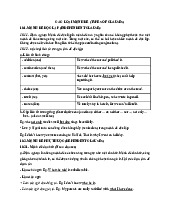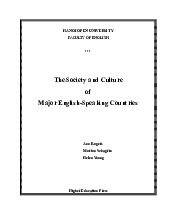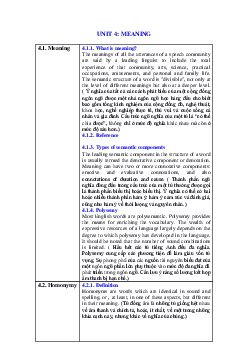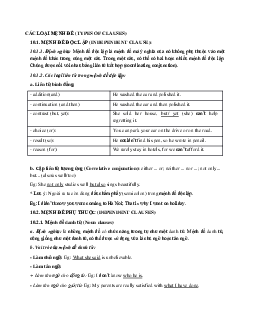





Preview text:
Etymology of English words 2.1 The origin of
_ English contains an immense number of words of
English vocabulary foreign origin. English belongs to the Indo-European
family of languages and its roots are closely related to those of French and Italian.
To illustrate the family relationship of these languages,
here are the words for mother and brother. English mother brother German mutter bruder … 2.2. Historical
There are 6 historical events in the development of development of English:
English vocabulary + The first century B. C:
The Romans teach the Germanic people how to make
butter and cheese and how to use the Latin words to name them
+ The fifth century , A. D:
Some Latin words entered the Anglo - Saxon languages
through Celtic influence. Place names such as Avon, Exe,
Esk, Usk and Ux originate from Celtic words meaning river and water.
+ The seventh century , A. D:
The first schools in England were church schools, and the
first teachers were priests and monks. Latin was the
official language of the Christian church in England at
this time. It was also the beginning of a new period of Latin borrowings.
+ From the 8th century to the middle of the 11th century:
Certain English words changed their meanings under the
influence of Scandinavian words of the same root.
England underwent several Scandinavian invasions.
O.E. bread acquired its modern meaning by association with the Scandinavian braud. + 1066:
Norman French words from the Norman dialect
penetrated every aspect of social life. .
Here is a very brief list of examples of Norman French borrowings *
Administrative words: state. (Các từ hành
chính: chính phủ, hội đồng, quyền lực, nhà nước). government, council, power, *
Legal terms: court, crime, prison, judge.
(Thuật ngữ pháp lý: tòa án, tội phạm, nhà tù, thẩm phán). *
Military terms: war, soldier, battle, officer.
(Các thuật ngữ quân sự: chiến tranh, người lính, trận chiến, sĩ quan). * Educational terms:
( Thuật ngữ giáo dục: học sinh, bút, bút chì, bài học, thư viện).
pupil, pen, pencil, lesson, library.
e.g. plate, saucer, autumn, uncle, river, etc.. ví dụ: đĩa, đĩa, mùa thu,
revival of interest in the ancient chú, sông, v.v.). .
+ The Renaissance Period: In
significant developments in science, art and culture and also by a
scientific and artistic terms:
civilizations of Greece and Rome and their languages ).
England, as in all European countries, this period was marked by
Greek Renaissance borrowings: ( *
They were mostly abstract words: The most
e.g. filial, moderate, intelligent, elect (ví dụ. hiếu thảo, sound and look very
ôn hòa, thông minh, quyết định-chọn lựa) * There were numerous
( Có rất nhiều thuật ngữ khoa học và nghệ thuật
e.g. datum, status, phenomenon, music ( ví dụ. dữ liệu, trạng thái, hiện tượng, âm nhạc) * The same is true of
Điều này cũng đúng với các khoản vay mượn thời Phục hưng của Hy Lạp)
e.g. cycle, ethics, esthete ( chu kỳ, đạo đức, thẩm mỹ)
During the Middle Ages, many borrowed words entered English from
significant once more were French borrowings and are known as Parisian borrowings. These words of French origin other European languages.
different from their Norman predecessors. They come from the
Parisian dialect of French.e.g. police, machine, ballet, matinée
Italian also contributed a considerable number of words
to English : (Tiếng Ý cũng đóng góp một số từ đáng kể cho tiếng Anh:) e.g. opera , alarm , colonel
The initial sk usually indicates Scandinavian origin and words of Latin
and French origin by certain suffixes, prefixes or endings. ( Sk ban đầu
thường chỉ ra nguồn gốc Scandinavia và các từ có nguồn gốc Latinh và
Pháp bằng một số hậu tố, tiền tố hoặc kết thúc nhất định). 2.3. The native element in English Native articles, prepositions and English
pronouns, auxiliaries and words denoting comprises everyday a large vocabul objects and ideas . number ary essentially Germanic have The grammatical structure is foreign influence . remained unaffected by of high-frequency wor foot, nose, ds like lip + + + + ) + INDO- EUROPEAN GROUP + (1-100)
family relations : father, mother. Brother Parts of the + human body: +
Animals : cow, swine, goose +
Plants : tree, birch, corn + Times of day: day, night
Heavenly bodies: sun, moon, star (thực thể trên trời
Numerous adjectives: red, new, glad +
The numerals from one to a hundred +
Pronouns: personal, demonstrative +
Numerous verbs: be, sit, eat + + Germanic element
+ Parts of the human body: head, hand, arm + Animals : fox, calf, bear + Plants : oak, fir, grass th century or
+ Natural phenomena : rain, Frost
+ Seasons of the year: winter, Spring, summer
Landscape features : sea, land
Human dwellings and furniture : house, room bench later) Sea-going vessel: boat, ship
Adjectives : Green, Blue, grey, white
Verb: sea, hear, speak. Tell. Say
English Proper element ( appear in the 5
2.4. The - Do borrowed words change or do they remain the same?
process Words migrate from one language to another in two ways: either they of
remain alien in appearance, or they are assimilated and become part of
borrowi the native language's ng
cultural fabric. Borrowed words are adjusted in the
three main areas of the new language system: phonetic,
grammatical, and semantic. ( Các từ di chuyển từ ngôn
ngữ này sang ngôn ngữ khác theo hai cách: hoặc chúng
vẫn còn xa lạ về hình thức, hoặc chúng được đồng hóa
và trở thành một phần của cấu trúc văn hóa của ngôn
ngữ mẹ đẻ. Các từ mượn được điều chỉnh trong ba lĩnh
vực chính của hệ thống ngôn ngữ mới: ngữ âm, ngữ pháp và ngữ nghĩa). - Phonetic adaptation
Norman-French borrowings have been fully adapted to
the phonetic system of the English language. Some of
the later (Parisian) borrowings, even those borrowed
from France as early as the 15th c., still sound
surprisingly French in their Received Pronunciation.
- Grammatical adaptation
If it is a noun, it is certain to adapt to a new system of
declension, if it's a verb, it will be conjugated
according to the rules of the recipient language. - Semantic adaptation
Sometimes a word may be borrowed blindly, for no
obvious reason, and find that it is not wanted because
there is no gap in the vocabulary. Semantic adaptation
means adjusting to the system of meanings of the verb
vocabularies. The adjective nice was a French
borrowing meaning " silly " at first. 2.5. Creating new
It is often the case that a word is borrowed by several English words
languages, and not just by one. Such words usually
convey notions which are significant in the field of communication. *
Many of them are of Latin and Greek origin.
Mostnames of sciences are international (Nhiều người
trong số họ có nguồn gốc Latinh và Hy Lạp. Hầu hết
các tên khoa học là quốc tế)
e.g. philosophy, mathematics, physics, chemistry, biology, lexicology. *
There are also numerous terms of art in this group:
(Cũng có nhiều thuật ngữ nghệ thuật trong nhóm này:)
e.g. music, theatre, drama, tragedy, comedy, artist, primadonna. *
It is quite natural that political terms frequently occur in the international words:
e.g. atomic, antibiotic, radio, television, sputnik. *
The English language also contributed a
considerablenumber of international words to world
languages. Among them the sports terms occupy a prominent position :
e.g. football, volleyball, hockey, cricket, golf, etc. *
Fruits and foodstuffs imported from exotic
countriesoften transport their names too and, being
simultaneously imported to many countries, become
international : (Trái cây và thực phẩm nhập khẩu từ
nước ngoài cũng thường vận chuyển tên tuổi của chúng
và đồng thời được nhập khẩu sang nhiều nước, trở thành quốc tế:)
E. g. coffee, chocolate, avocado, grapefruit.
By translation-loan we indicate borrowings of a
special kind. They are not taken into the vocabulary of
another language more or less in the same phonemic
shape in which they have been functioning in their own
language, but undergo the process of translation 2.6. Characteristics
In general, we should not be misled into thinking that of modern English
all short common words are native, and that only three- vocabulary
and four- syllable words come from foreign sources.
Words like very, air, hour, cry, oil, cat, pay, box, face,
poor, dress are of foreign origin despite their native appearance and common use



